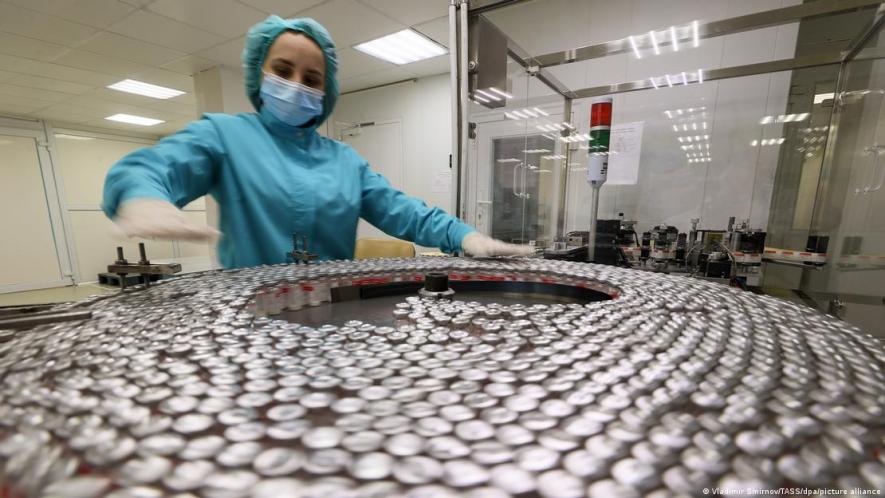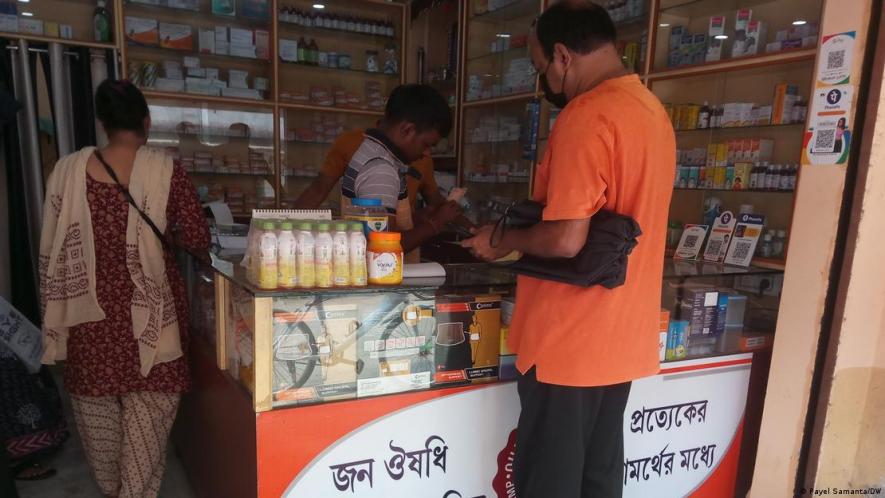Pandemic Worsens Resistance to Antibiotics in India

At the weekly COVID-19 briefings which Dr. Rajeev Jayadevan chairs in Ernakulam, located in the south Indian state of Kerala, a worrying complaint kept cropping up. Doctors from multiple local hospitals in the district were reporting a rise in difficult-to-treat bacterial infections. The pathogens, they said, no longer seemed to be responding to common antibiotics.
Data observed by Jayadevan in the district also showed a clear trend: An increase in drug-resistant infections since the start of the COVID-19 pandemic.
"It is going to affect the survival of critically ill patients in the ICU. That's the part that really worries me," Jayadevan told DW.
Antimicrobial resistance
Even before the pandemic, rising antimicrobial resistance (AMR) — which happens when pathogens become resistant to drugs such as antibiotics — was an issue of global concern.
A report published in The Lancet earlier this year estimated that drug-resistant infections were directly accountable for almost 1.3 million deaths in 2019. Now, experts warn that the COVID-19 pandemic may have accelerated the trend, with a new report showing a drastic increase in resistance to several important antibiotics and antifungals in India in the past year.
The research, published by the Indian Council of Medical Research (ICMR) last month, found that resistance to carbapenems — a class of drugs mostly administered to treat common infections such as pneumonia in ICU settings — spiked in 2021, limiting the availability of treatment options.
"We are running out of drugs to treat sepsis or to treat very severe infections which are caused by highly drug-resistant pathogens," said Kamini Walia, a senior scientist at the ICMR and lead author of the report.

Antimicrobial resistance is largely caused by unnecessary overconsumption of antibiotics
Drug misuse
Antimicrobial resistance arises naturally through the process of evolution, but drug misuse can accelerate the process. If a patient consumes the wrong antibiotic, or takes the drugs incorrectly, there is a risk that some of the bacteria will fail to be killed off. The remaining bacteria then propagate, leading to an increase in drug-resistant pathogens in the environment.
In India, a high burden of infectious diseases and a chronically underfunded healthcare system have contributed to rising levels of AMR.
"Poor infection control [in hospitals] and absence of diagnostic support are the two key drivers," said Walia.
India spends just 1.25% of its GDP on public healthcare, the fifth lowest in the world, according to a 2020 report published by Oxfam.
Antimicrobial misuse, and particularly the indiscriminate use of broad-spectrum antibiotics, also played a major role in increasing drug resistance in the country, said Walia.
Research published in The Lancet earlier this year warned that widespread use of unnecessary antibiotics was a significant driver of AMR in India, with over 47% of antibiotics used in the private sector in 2019 not approved by the country's central pharmaceutical regulatory body.
Little to no oversight
Regulations on distribution, where they exist, are also sparsely enforced. When Jayadevan first returned to India after studying abroad, he remembered being shocked at the ready availability of over-the-counter antibiotics.
"You could walk into a pharmacy and ask for amoxicillin, ciprofloxacin, whatever," he said. "It's like buying oranges or grapes or apples from a fruit vendor. That's unacceptable."
The COVID-19 pandemic exacerbated the problem, boosting both patient demand and hospital administration of antimicrobials in a pre-emptive attempt to limit secondary infections. An estimated 216 million excess doses of antibiotics were consumed in India between June and September 2020 alone.
"Antibiotics flew off the shelves. Clearly the pandemic contributed to rampant antibiotic overuse in the country," said Jayadevan.
A high number of patients in hospitals, combined with overstretched medical staff, meant that infection control measures such as handwashing were also compromised, leading to an uptick in secondary infections. Vaccination and sanitation programmes, aimed at preventing infections from occurring in the first place, were also put on hold.

The sale of antibiotics is not well regulated in India, doctors say
New guidelines, but little engagement
To address the threat of rising AMR, the ICMR introduced national Antimicrobial Stewardship guidelines in 2018, which laid out best practices for doctors, technology solutions for improved tracking of antimicrobial usage, and aimed to expand access to rapid diagnostic and antimicrobial susceptibility tools.
Whilst the efforts have so far been well-received in most hospitals, "funding, getting the skilled manpower and maintaining this momentum and focus, is going to be the key challenge," said Walia. "Sustained action and continuous efforts are required."
Fighting infections at their source is also essential, she added, by focusing on infection control measures in hospitals, sanitation programmes and vaccinations. Earlier this year, the World Health Organization issued an "urgent" call to ramp up research and development of vaccines to fight AMR.
The biggest drawback of the AMR programme in India so far however, said Walia, was a lack of engagement from the public. The latest ICMR report could be instrumental in helping to change that, raising awareness of the growing threat of AMR among policymakers and the public alike.
"Without evidence, we cannot engage policymakers," said Walia.
Edited by: Clare Roth
Get the latest reports & analysis with people's perspective on Protests, movements & deep analytical videos, discussions of the current affairs in your Telegram app. Subscribe to NewsClick's Telegram channel & get Real-Time updates on stories, as they get published on our website.
























